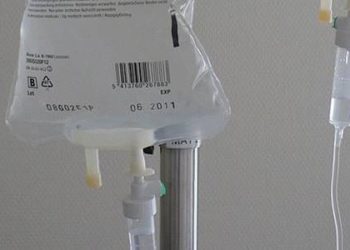Delayed tenecteplase use improves recovery in ischemic stroke
1. In this randomized controlled trial, among patients with ischemic stroke without access to thrombectomy, tenecteplase given between 4.5 and 24 hours after onset demonstrated improved disability-free survival.
2. Tenecteplase was associated with an elevated risk of symptomatic intracranial hemorrhage (ICH) compared to standard medical therapy.
Evidence Rating Level: 1 (Excellent)
Study Rundown: Timely treatment is critical in patients with ischemic stroke, with endovascular thrombectomy demonstrating benefits when performed up to 24 hours following onset. In those without access to this intervention, intravenous thrombolytics, namely alteplase, are effective when started up to nine hours following onset. In previous studies, tenecteplase has been demonstrated to be noninferior to alteplase at up to 4.5 hours after onset, but limited evidence exists for its use beyond this time point. The present trial investigated tenecteplase initiated between 4.5 and 24 hours after onset for patients with ischemic stroke and salvageable brain tissue who were without access to thrombectomy. Compared to standard medical therapy, tenecteplase resulted in similar survival rates but was associated with less disability by 90 days. However, tenecteplase was also associated with an elevated risk of symptomatic ICH compared to standard management. The study was limited by its open-label design, distinct patient characteristics as recruitment was exclusively in China, and overall milder stroke severity than other late-window trials. Nevertheless, these findings demonstrated a potential benefit for initiating tenecteplase beyond 4.5 hours following ischemic strokes in patients without immediate access to thrombectomy.
Click here to read the study in NEJM
Relevant Reading: Tenecteplase for Stroke at 4.5 to 24 Hours with Perfusion-Imaging Selection
In-Depth [randomized controlled trial]: This randomized controlled trial assessed the effect of tenecteplase initiated late in patients with ischemic stroke without access to thrombectomy. Patients 18 years of age and older who had had a stroke and presented within 4.5 to 24 hours with evidence of salvageable brain tissue on perfusion imaging were eligible for inclusion. Exclusion criteria included endovascular thrombectomy planned at randomization and guideline-based contraindications to thrombolytic. A total of 516 patients were randomized 1:1 to receive either tenecteplase or standard medical treatment. The primary outcome was the absence of disability at 90 days. By 90 days, the tenecteplase group had a higher percentage of patients without disability (33.0%) compared to the standard medical treatment group (24.2%) (relative rate, [RR] 1.37; 95% Confidence Interval [CI], 1.04-1.81; p=0.03). Accordingly, more patients receiving tenecteplase (43.6%) reported functional independence compared to those receiving standard treatment (33.3%). Similar trends favoring tenecteplase were observed in the reperfusion rate at 24 hours (RR, 1.70; 95% CI, 1.10-2.64). Mortality at 90 days was comparable between the two groups: 13.3% for tenecteplase and 13.1% for standard medical treatment (RR, 1.01; 95% CI, 0.65-1.58). Notably, tenecteplase was associated with a higher incidence of symptomatic ICH within 36 hours of randomization (8 patients, 3%) compared to standard medical treatment (2 patients, 0.2%). These results suggested that for patients with ischemic stroke who presented at 4.5 to 24 hours and did not have access to thrombectomy, treatment with tenecteplase could improve disability and functional outcomes.
Image: PD
©2024 2 Minute Medicine, Inc. All rights reserved. No works may be reproduced without expressed written consent from 2 Minute Medicine, Inc. Inquire about licensing here. No article should be construed as medical advice and is not intended as such by the authors or by 2 Minute Medicine, Inc.









